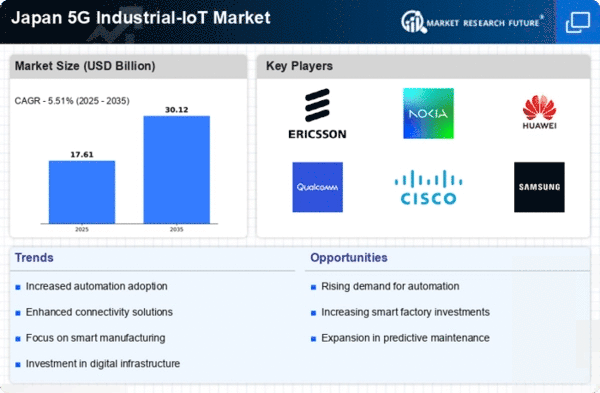Rising Demand for Automation
The increasing demand for automation across various industries is significantly influencing the 5G Industrial-IoT Market in Japan. As companies strive to enhance efficiency and reduce operational costs, the integration of IoT devices and 5G technology becomes essential. Automation solutions, such as robotics and smart sensors, are being adopted at an accelerated pace, with the market for industrial automation projected to reach ¥3 trillion by 2026. This trend indicates a strong correlation between automation and the growth of the 5g industrial-iot market, as businesses seek to harness the capabilities of 5G to facilitate seamless communication and data exchange among automated systems.
Enhanced Connectivity Solutions
The 5G Industrial-IoT Market in Japan is experiencing a surge in demand for enhanced connectivity solutions. With the advent of 5G technology, industries are able to achieve unprecedented levels of connectivity, enabling real-time data transmission and communication between devices. This is particularly crucial for sectors such as manufacturing and logistics, where timely information can lead to improved operational efficiency. According to recent data, the implementation of 5G in industrial settings is projected to increase productivity by up to 30%. As companies seek to leverage these advancements, the 5g industrial-iot market is likely to expand significantly, driven by the need for reliable and high-speed connectivity.
Focus on Data Security and Privacy
In the context of the 5G Industrial-IoT Market, data security and privacy have emerged as critical concerns for businesses in Japan. As industries increasingly rely on interconnected devices, the potential for cyber threats escalates. Consequently, there is a growing emphasis on implementing robust security measures to protect sensitive information. Companies are investing in advanced cybersecurity solutions, which are projected to grow at a CAGR of 15% over the next five years. This focus on security not only safeguards operational integrity but also enhances trust among stakeholders, thereby driving the adoption of 5G technologies within the industrial sector and contributing to the overall growth of the 5g industrial-iot market.
Government Initiatives and Support
Government initiatives in Japan are playing a pivotal role in the growth of the 5G Industrial-IoT Market. The Japanese government has been actively promoting the adoption of 5G technology through various policies and funding programs aimed at enhancing industrial competitiveness. For instance, investments in infrastructure development and research grants for innovative IoT applications are expected to bolster the market. The government's commitment to digital transformation is evident, with plans to allocate approximately ¥1 trillion towards 5G-related projects by 2025. Such support not only encourages private sector investment but also fosters collaboration between public and private entities, thereby accelerating the growth of the 5g industrial-iot market.
Integration of AI and Machine Learning
The integration of artificial intelligence (AI) and machine learning (ML) technologies into the 5G Industrial-IoT Market is transforming operational paradigms in Japan. These technologies enable predictive analytics, real-time monitoring, and enhanced decision-making capabilities, which are essential for optimizing industrial processes. As industries increasingly adopt AI-driven solutions, the market for AI in IoT applications is expected to reach ¥1.5 trillion by 2027. This integration not only improves efficiency but also facilitates the development of smart factories, where machines communicate and learn from each other. Thus, the synergy between AI, ML, and 5G is likely to propel the growth of the 5g industrial-iot market, fostering innovation and competitiveness.
















